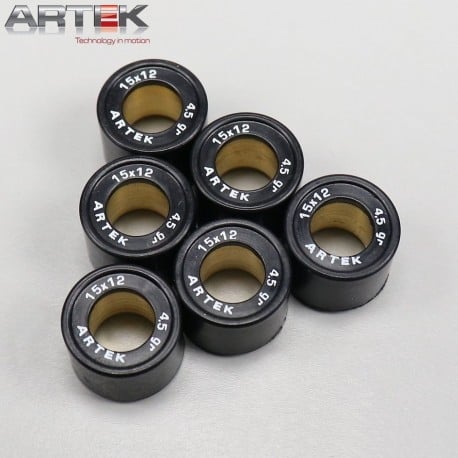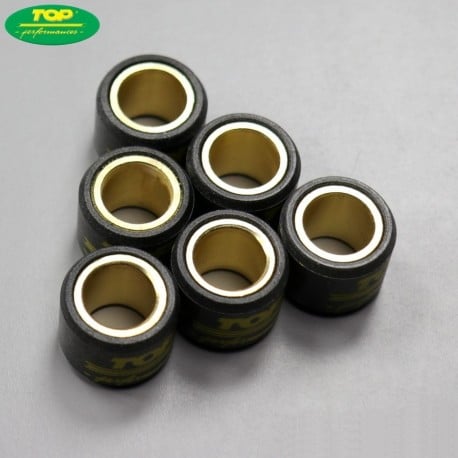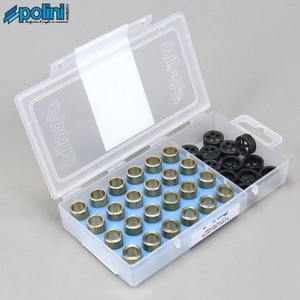
CHOOSE YOUR SCABS WELLTS QUAD
Variator Roller Performance
The first criterion to take into account to choose the right rollers and the weight:
- Same weight as original = similar performance
- Heavier rollers than the original ones = Increased torque
- Pebbles lighter than the original ones = Increase in engine speed
- Imperatively take pebbles of the right size (in mm)
The rollers of a quad: when to change them?
The variator rollers are parts that wear out over time. When they are damaged, they lose material and weight, leading to power losses. Changing the variator rollers is an essential thing to do regularly (approximately every 2000 km). On the other hand, if you change the exhaust, you have to lighten the variator (only for 2-stroke quads). If you notice jolts and if you hear rattling noises from the drive, it's time to think about replacing the rollers. Visually, a worn pebble can be recognized by one of its sides (or several) flats.
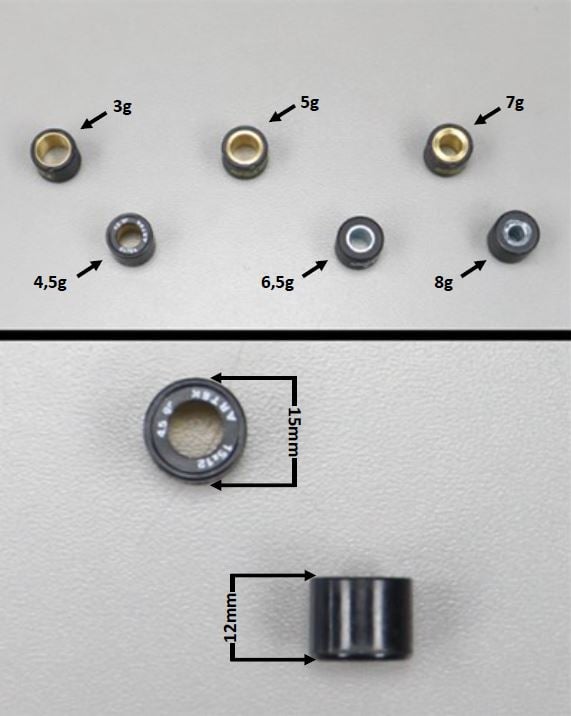
What size for your quad variator rollers?
The size of the rollers depends on the type of variator installed on your quad. Each type of variator has specific roller measurements. To adjust the variation we use the weight of the rollers so as to be able to perfectly adjust the variation of the quad to the desired speed.
Too heavy rollers cause the variator to close before the clutch engages.
If they're too light, your engine will rev high, and grind "in a vacuum". On the contrary, if they are too heavy, your engine will rev too low, which will instantly affect performance.
You can also check that your belt goes up to the top of your drive. Tracez a line at the marker from the center to the outside of your dimmer, take a spin and see if it has faded enough!
It is therefore important to choose them carefully, adjusting their weight according to the engine configuration of your quad.
There are several types of rollers (heavy, medium and light) for your quad. The pebbles are distributed par weight:
- 2,5 g to 5,0 g is for acceleration
- 5,0 g to 6,5 g is the balance
- 6,5 g to 12,0 g is speed
The difference in weight between the heaviest and the lightest roller should not be too great.
Rollers that are too heavy can cause the variator to open before the clutch engages.
What role do rollers play on your quad?
To fully understand the role of the rollers, you must first explain how the variator works. On a quad, it serves as a sort of gearbox. In fact, the driver of a quad does not change gears, they change depending on the engine speed thanks to the variator which is responsible for changing the reduction ratio of the transmission when accessing leration.
In practice, the drive consists of:
• With a fixed cheek
• A movable cheek in which there are 3 or 6 pebbles. There are several types of pebbles (heavy, medium and light)
When the quad is started, the motor drives the variator and the belt travel. The higher the motor rotation speed, the faster the drive rotates. The rollers then move away from the inside towards the outside of the moving wheel. Thanks to the force centrifugal, the rollers then cause the movement of the movable cheek (it moves closer to the fixed cheek) which causes the stroke of the belt to evolve (with a higher radius). This is what allows the quad to change gear “automatically”.
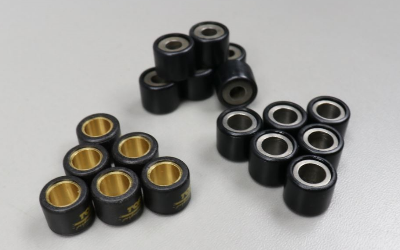
Conclusion
To choose the right rollers for your machine, you need to consider their weight and size. There are adjustable pebble boxes which will simplify the adjustment of the rollers.
Examples of common models
Remember to consult our tutorials videos and writings on the replacement of the variator, In theclutch and belt for scooters. We offer a large selection of pebble madear different brands like Polini, Top Performances, Artek. Each brand offers rollers of different sizes and several weights in order to find the best ones for your scooter.
Pebble selection criteria:
- Engine characteristics
- Choice of weight and size
- Replacement of the originally defective part or for an increase in performance
Replacing the rollers is a long operation which requires rigor and precision.
To obtain a smooth ride, it is advisable to mount the recommended rollers.ar the constructor.
The weight of the rollers will make it possible to increase the rotational power of the crankshaft.
Heavy rollers are often used to increase the top speed of a stock quad.
Adjusting your variator and clutch
To fully understand the operating system of the variator, it is also necessary to study that of the clutch car they work together.
To sum up, let's take the example of the bicycle!
Let's imagine that the variator is the crankset and the clutch is the rear rim sprockets.
The variator consists of a barrel, a cheek, a flange, three sliders, and 3 or 6 rollers.
Mid-heavy pulleys are used for completely stock quads with a medium-soft, fairly long clutch spring.
The weight of the pebbles will give more force to the variator (which compensates for the lack of motor power) which will open faster than with medium or light rollers when rotating during acceleration.
The weight of the rollers will make it possible to increase the rotational power of the crankshaft.
Heavy rollers are often used to increase the top speed of a stock quad.
A quad with excessive power must be adjusted with a flexible and short clutch spring and ultra-light rollers or even put only three rollers in the variator!
Above all, do not install a hard spring in your clutch, otherwise you will break your transmission belt every week! For what ? Your quad being powerful and equipped with a hard spring, the belt undergoes enormous pressure between the variator and the clutch and ends up par to break !
Tuning Techniques
To start, choose your clutch spring and the three small springs according to the power of your quad then mount them on your clutch.
Then, get plenty of pebbles to test all the possibilities.
Is your quad spinning but not moving forward?
Your variator is not loaded enough, slightly increased the weight of the rollers.
Has your quad lost all its power and can no longer get going?
Don't panic, you just need to lighten your drive.
Your quad takes off well, then it hits the hole at 40 mph?
You need to change your clutch spring par another more rigid one or lighten your variator.
The variator/clutch settings are quite difficult and require a lot of patience!






















